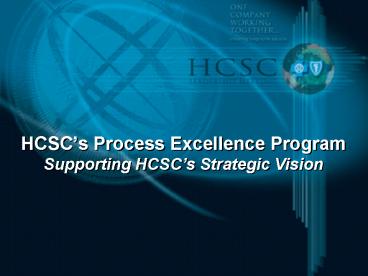HCSCs Process Excellence Program Supporting HCSCs Strategic Vision - PowerPoint PPT Presentation
1 / 16
Title:
HCSCs Process Excellence Program Supporting HCSCs Strategic Vision
Description:
ITIL A set of best practices for IT Service Management. ... ITIL IT Service Delivery and Service Support focused; How we should meet the ... – PowerPoint PPT presentation
Number of Views:62
Avg rating:3.0/5.0
Title: HCSCs Process Excellence Program Supporting HCSCs Strategic Vision
1
HCSCs Process Excellence Program Supporting
HCSCs Strategic Vision
2
Agenda
- Process Excellence Program Overview
- Implementation of a Governance Model
- Critical Success Factors
- Lessons Learned To date
3
Program Business Drivers
- 2010 Vision
- Significant Membership Growth
- Best in Class Service
- Leading Brand
- Center for Process Excellence
- Our goal was to improve our business processes.
- We soon realized that we had to do more.
- We needed to focus on
- doing business differently
- behaving differently and
- providing a foundation on which we can achieve
our strategic objectives and move into the
future. - Regulatory Compliance
4
PEP is aligned with ITGs Vision Points
ENSURE RELIABILITY AND AVAILABILITY IN DELIVERY
OF ALL SERVICES
DELIVER FLEXIBLE SOLUTIONS THROUGH SEAMLESS
INTEGRATION CAPABILITIES
MANAGE CAPACITY TO SCALE WITH CHANGING DEMAND
SUPPORT HCSCS INDUSTRY AND OPINION LEADER ROLE
PEP Goals Outcomes
BE A CUSTOMER FOCUSED SERVICE ORGANIZATION
- Responsive
- Reliable
- Compliant
- Scalable
ACCELERATE PRODUCT SPEED TO MARKET
BE A TRUSTED PARTNER IN THE MANAGEMENT OF
INFORMATION
BE THE IT PARTNER OF CHOICE
ENABLE MERGER EXCELLENCE
5
PEP Phase I - In A Nutshell
- Reliable control over changes to the production
environment - Responsive development and delivery of reliable
new business systems - Responsive and reliable resolution of IT
incidents - Achieving regulatory compliance
- Supporting cultural change
6
Just enough process
7
Agenda
- Process Excellence Program Overview
- Implementation of a Governance Model
- Critical Success Factors
- Lessons Learned To date
8
Frameworks for Governance at HCSC
- COSO Governance Framework that was developed
and is targeted at controlling and governing
financial reporting processes. - CobiT IT Governance Framework that was
developed originally to support IT Auditors.
Since SOx it has become a helpful tool for IT
Managers to IT Governance with regulatory
compliance. - ITIL A set of best practices for IT Service
Management. - CMMi SEI A process improvement approach for
Software Engineering
9
COSO Internal Control Framework Part of
Sarbanes-Oxley Compliance is COSO Adoption
- Control Activities
- Policies/procedures that ensure management
directives are carried out. - Range of activities including approvals,
authorizations, verifications, recommendations,
performance reviews, asset security and
segregation of duties.
- Monitoring
- Assessment of a control systems performance over
time. - Combination of ongoing and separate evaluation.
- Management and supervisory activities.
- Internal audit activities.
- Control Environment
- Sets tone of organization-influencing control
consciousness of its people. - Factors include integrity, ethical values,
competence, authority, responsibility. - Foundation for all other components of control.
- Information and Communication
- Pertinent information identified, captured and
communicated in a timely manner. - Access to internal and externally generated
information. - Flow of information that allows for successful
control actions from instructions on
responsibilities to summary of findings for
management action.
- Risk Assessment
- Risk assessment is the identification and
analysis of relevant risks to achieving the
entitys objectives-forming the basis for
determining control activities.
10
Using the Frameworks for ITG
- CobiT Risk Control focused What we should
doing Foundation of our policies. - ITIL IT Service Delivery and Service Support
focused How we should meet the objectives
related to IT Operations and Production Support.
HCSC is focused on Service Delivery Service
Support components - CMMi IT Systems Development and Project
focused How we should meet the objectives
related to Systems Development. HCSC is focused
on CMMi level 2 and some level 3 capabilities.
Plan
Report
Run
Build
CMMi
ITIL
CobiT
11
COSO As it relates to IT Governance PEP
- Control Environment
- Policy team
- Tone at the top through Organizational Change
Communication - Risk Assessment
- Risk Management team
- Information Communication
- Organizational Change and Communication
- Control Activities
- Process Control Frameworks ?CobIT, ITIL, CMMi
- Monitoring
- Internal Control Monitoring
- Metrics and Measures
12
Implementation Roadmap
- Creation of Governance Framework defined where
we wanted to be - Development of Process Model for ITG
- Team formation with team leads and process owners
- Process Design Sessions
- Project Initiation Business Case
- Detailed Design
- Org Design
- Process Design
- Technology Design
- Construction
- Development of roles, responsibilities,
incentives and measures - Development of procedures, job aids, and other
user guides - Development and integration of technology
environments - Development of training
- Pilots
- Implementation
- Training
- Acceptance Criteria
- Go Live
Communication Customer Engagement
13
Agenda
- Process Excellence Program Overview
- Implementation of a Governance Model
- Critical Success Factors
- Lessons Learned To date
14
How will we sustain our progress?
- Adoption model and measurement
- Program wide and Project specific metrics
- Substantial training and continuous development
- On site coaches and advisors supporting the new
process teams - New PDR/Assessment tools and metrics to shift
thinking to a process organization - Revised ITG Incentive plan that supports process
behaviors - An ongoing Process Center/Team to ensure
sustainability and process growth on an ongoing
basis into the future
15
Agenda
- Process Excellence Program Overview
- Implementation of a Governance Model
- Critical Success Factors
- Lessons Learned To date
16
Lessons Learned
- Manage the scope of the change effort (Phase I,
Phase II) - There are no one sized fits all solutions
- Deemphasize the frameworks as soon as you can
(they are a means to an end, not the end) - Business Engagement and buy-in is critical































